In 2017, Labor leader Mark McGowan was swept into power in Western Australia (WA), winning the largest majority government and seat tally in the state’s parliamentary history until that point—taking 41 of the 59 seats in the Legislative Assembly. McGowan resigned last year, handing over the reins to Roger Cook.
It would seem to make little sense for Cook to contemplate overturning one of McGowan’s first policies: a ban on uranium mining in the state.





